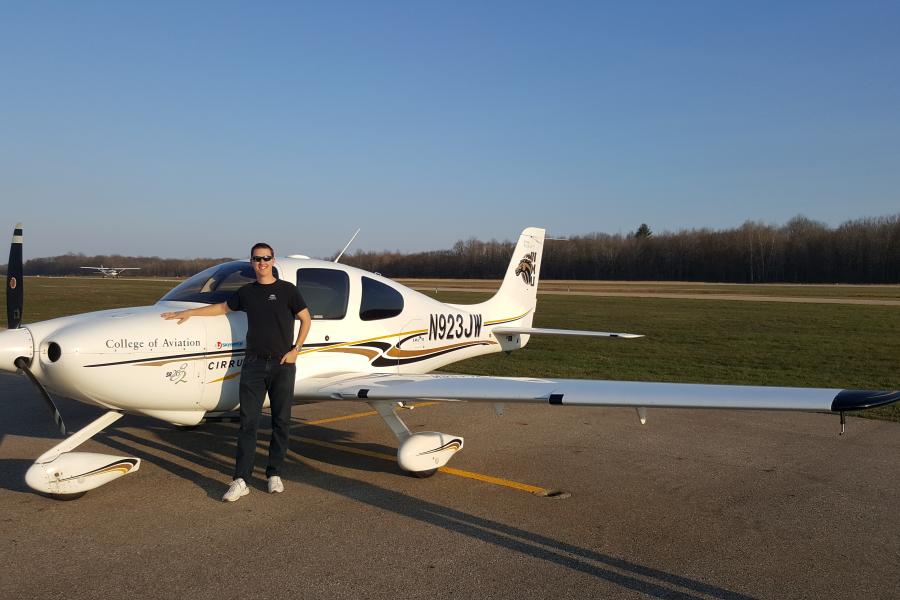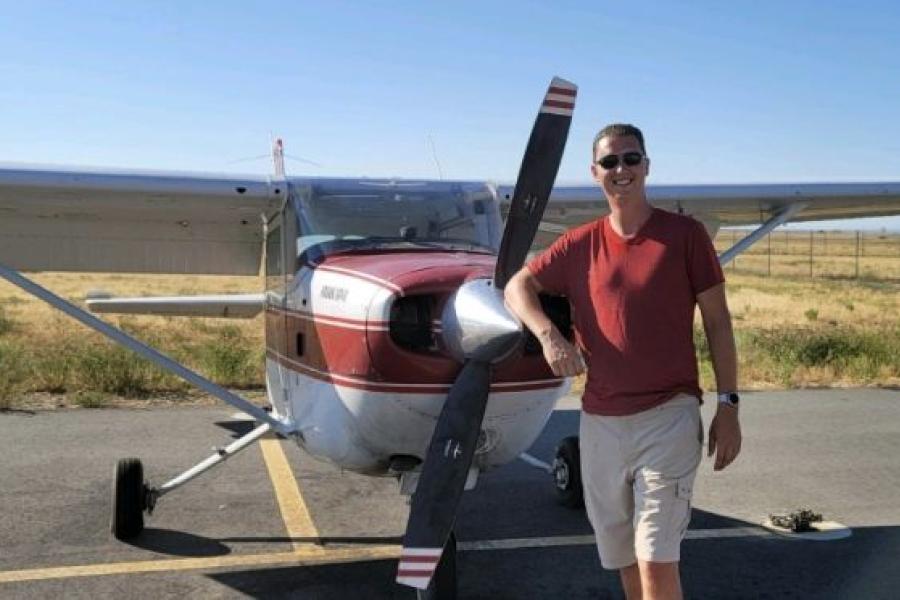Looking for success at WMU? The sky is not the limit!

Alumnus Tyler Wall not only works in the aerospace and aviation industry, he is pursuing his pilot's license. He even had the opportunity to fly in a WMU College of Aviation plane during his time at Western, collecting flight performance data later used in his master's thesis.

Alumnus Tyler Wall not only works in aerospace and aviation, he is pursuing his pilot's license. He even had the opportunity to fly in a WMU College of Aviation plane during his time at Western.
KALAMAZOO, Mich.—For Tyler Wall, B.S.’15, M.S.’17, success as a lead engineer at Williams International has its roots in the hands-on, project-based education he undertook as an aerospace engineering student at Western Michigan University’s College of Engineering and Applied Sciences.
“Our courses balanced the technical and the practical so that as engineers we can approach real-world problems effectively,” explains Wall. “This is especially applicable in my career as many of the classes at the college were project-based and required working on a team, understanding how to approach a problem, and knowing when and how to apply the right concepts and solutions to challenging situations.”
At Williams International, the world leader in the development, manufacture and support of gas turbine engines, Wall’s responsibilities include project management in production, engine testing, and program qualification in both military and commercial turbofan products. He leads a team of engineers and operators on the production of over 150 different jet engine components.
“Most of my days involve supporting production schedules and the needs of the assembly teams, assisting R&D teams with ensuring new designs for manufacturability, and addressing quality reports to improve or mitigate defects or obsolete processes in production. My work largely focuses on optimizing production schedules, ensuring that material, tooling, and programs are in working order to produce parts with minimal delays and high quality.”
Walls began his career at Williams as a rotation engineer learning the ropes first in engine testing where he implemented and evaluated proposed turbofan design changes. Then, a rotation in the mechanical design group had him working on system-level design projects ranging from the redesign of an oil tank, developing test plans for a new fuel pump, releasing drawing and specification revisions, investigating root causes of nonconforming parts and proposing corrective actions. Finally, Wall spent a third rotation in the manufacturing and facilities group where he led the relocation of multiple machines to a new production facility to consolidate processes and improve production efficiency. Wall returned briefly to R&D engine testing before accepting his current position leading critical production projects.
“At work, I interact with our vice presidents of manufacturing, supply chain and engineering directors. It has stood out to me how multi-disciplined they are and focus on the big picture and how a decision will have ripple effects across the enterprise,” says Wall. “Most notably, our vice president of manufacturing is always asking questions. I find this very interesting as over the years. I have noticed that approaching a problem one way is appropriate for some designs or situations, but not others.”
Looking forward, Wall is excited to be part of the evolving aerospace industry with its numerous advancements in technologies in recent years.
“NASA will be flying a new supersonic aircraft this year, the X-59. A handful of other companies are also looking to restart supersonic travel,” he says. “Space exploration is reaching a new era where weekly rocket launches and commercial access to space will become a norm. Several new military programs are studying the use of hypersonic technology and replacement of dated planes and systems. Advancements in artificial intelligence and control systems will continue to make aircraft safer, offer greater redundancy in system safety, and improve operations to minimize fuel use and time spent traveling. Most importantly, I am excited for electric and hybrid propulsion systems being implemented on regional air routes and in air urban air mobility applications such as flying taxis and same hour package delivery. This new technology is closely aligned with my master’s thesis, and it is exciting to see a new market emerge that was only a concept during my academic career.”
For Wall, finding success began with exploring opportunities both in and outside of the classroom. His involvement in student organizations offered him the opportunity to participate in design competitions and conferences hosted by leading industry organizations such as the AIAA. These not only provided Wall networking opportunities, but also gave him exposure to the latest technologies and how best to apply practices in the engineering field to design projects, computer simulations and code or academic research.
To get the most of time at Western, Wall advises students to ask questions of faculty by visiting office hours to get extra insight to what you are studying and to demonstrate you have a genuine interest in your field and coursework. He urges students to seek out professional certifications such as Six Sigma, Project Management, Salesforce or coding. “Many of these can be found free online or for a small investment with huge returns both in salary and projects you receive at work based on the credentials you gain throughout your career,” he explains.
Wall also thinks it is important to pursue multiple internships. He completed three during his academic career. In 2014, he worked in technical publications at Textron aviation. He returned to Textron in 2015 in systems design on the Citation X+program. As a graduate student, he completed a third internship at Gulfstream Aerospace working as a certification engineer on the G700 and G800 advanced aircraft concepts.
“Do not be afraid to pave your own path and be sure to differentiate your academic and professional experience from the norm to stand out in today’s competitive marketplace. But above all else, have fun and cherish your time at Western Michigan University and don’t forget to stay in touch with your classmates, faculty and alumni association as your professional career develops,” he says.
You can follow Wall’s career on LinkedIn and view his peer-reviewed publications below.
- Hybrid Electric Aircraft Switched Model Optimal Control, AIAA Journal of Propulsion and Power, June 21, 2020 | View publication
- Survey of Hybrid Electric Propulsion for Aircraft, AIAA Propulsion and Energy Conference, July 8, 2017 | View publication
- Model Predictive Power Management of a Hybrid Electric Propulsion System, Western Michigan University, ScholarWorks, Nov. 15, 2017 | View publication
For more WMU news, arts and events, visit WMU News online.


